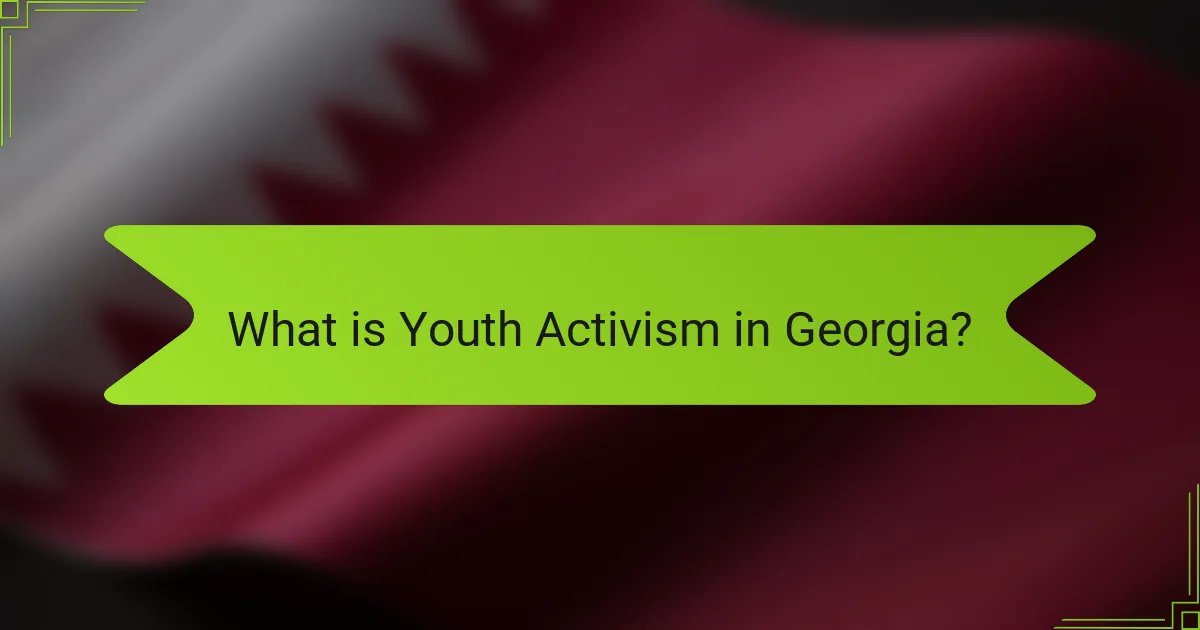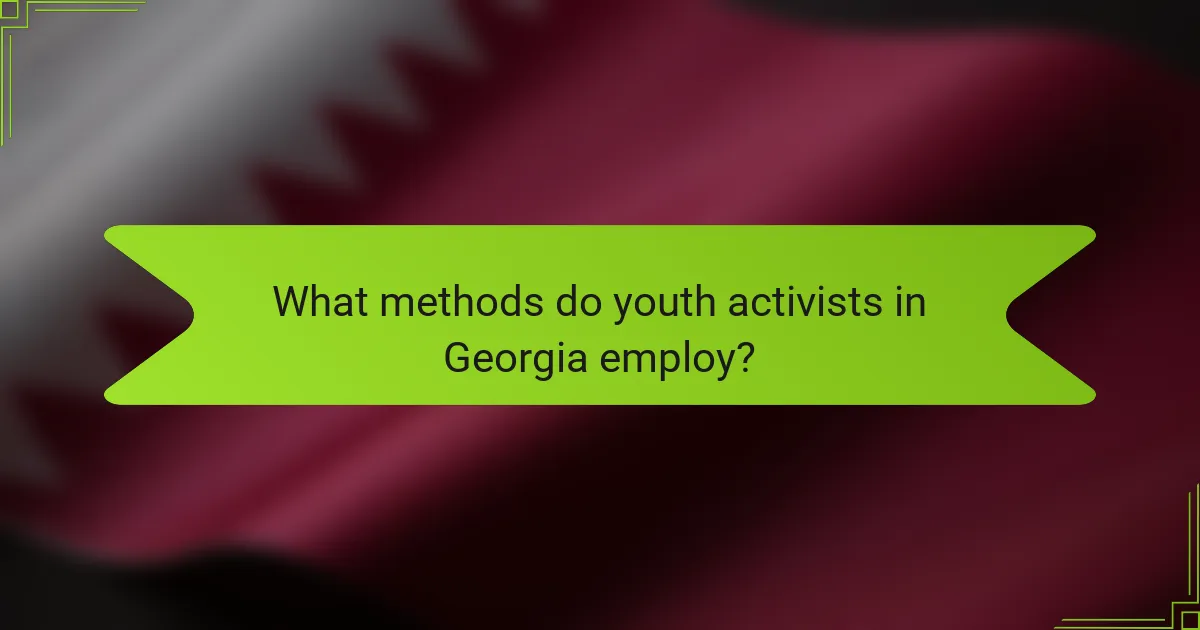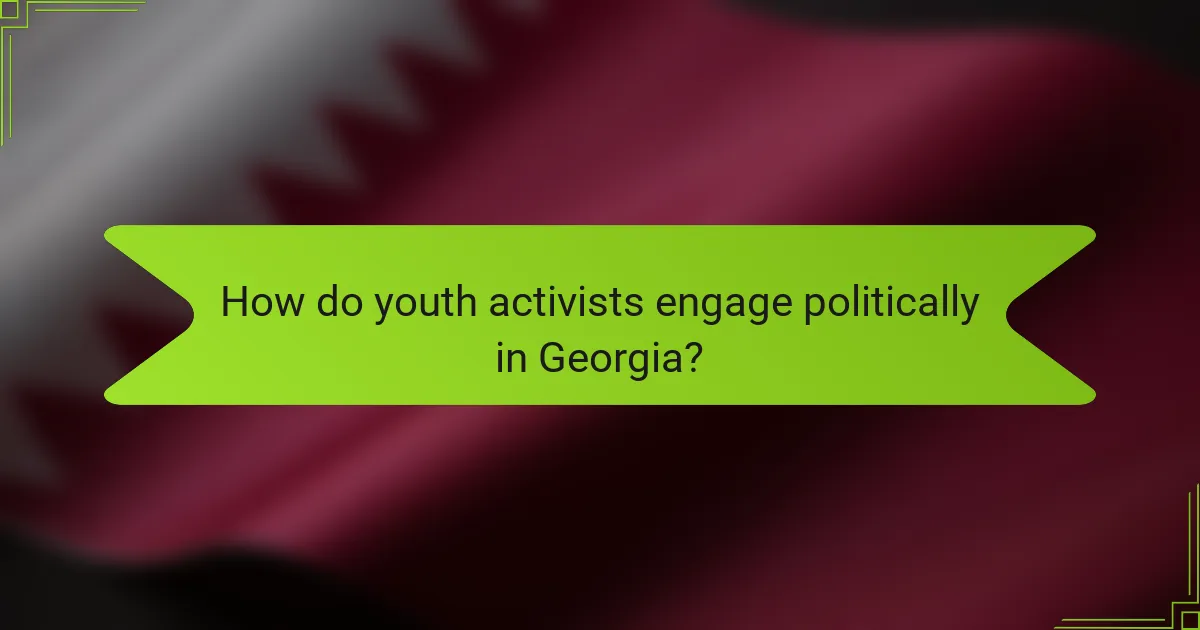Youth activism in Georgia encompasses the participation of young individuals in various social and political causes, primarily focusing on education, environmental justice, and civil rights. This movement has seen a significant increase in engagement, with youth activism rising by over 50% in recent years, as noted in a 2020 report by the Georgia Alliance for Social Justice. Young activists employ diverse methods such as protests, social media campaigns, community outreach, and policy advocacy to raise awareness and drive change. Their involvement includes organizing demonstrations, collaborating with NGOs, and participating in local government meetings, showcasing a commitment to influencing legislation and addressing pressing societal issues.

What is Youth Activism in Georgia?
Youth activism in Georgia refers to the engagement of young people in social and political causes within the state. This activism often focuses on issues such as education, environmental justice, and civil rights. Young activists in Georgia utilize various methods, including protests, social media campaigns, and community organizing. The rise of youth activism has been significant, particularly in response to recent political and social challenges. According to a 2020 report by the Georgia Alliance for Social Justice, youth participation in activism has increased by over 50% in recent years. This surge indicates a growing awareness and commitment among young people to influence change in their communities.
Why is youth activism significant in Georgia?
Youth activism is significant in Georgia because it drives social change and political engagement. Young people in Georgia advocate for issues like education reform, environmental protection, and human rights. Their activism has led to increased awareness of these critical issues among the broader population. For example, youth-led movements have successfully organized protests and campaigns that influence local and national policies. In 2020, the youth played a vital role in the protests against systemic racism and police brutality. This activism fosters a sense of community and empowers young individuals to participate in the democratic process. Overall, youth activism shapes the future of Georgia by promoting civic responsibility and encouraging a new generation of leaders.
How has youth activism evolved in Georgia over the years?
Youth activism in Georgia has evolved significantly over the years. Initially, youth activism focused on issues like civil rights and education reform. In the 1960s, young people played a crucial role in the civil rights movement, advocating for racial equality. By the 1980s, activism shifted towards environmental issues and political reform. The rise of the internet in the 2000s transformed youth activism, enabling broader outreach and organization. Recent movements have addressed social justice, climate change, and political participation. Events like the 2018 student-led protests against gun violence highlighted youth’s growing influence. Today, social media platforms serve as vital tools for mobilization and awareness.
What are the key historical events that influenced youth activism in Georgia?
Key historical events that influenced youth activism in Georgia include the Civil Rights Movement, the 2003 Rose Revolution, and the 2018 protests against the government. The Civil Rights Movement in the 1960s inspired youth to advocate for social justice and equality. The Rose Revolution marked a significant shift in political engagement among young people, leading to increased activism for democratic reforms. In 2018, widespread protests against police violence galvanized youth participation in advocating for accountability and justice. These events collectively shaped a culture of activism among Georgia’s youth, emphasizing their role in political change.
What motivates young people to engage in activism in Georgia?
Young people in Georgia are motivated to engage in activism by a desire for social change and political representation. They often seek to address issues such as corruption, human rights, and environmental concerns. The 2020 protests against government policies highlighted their demand for accountability. Additionally, youth are influenced by social media, which amplifies their voices and connects them to global movements. Educational institutions also play a role by fostering critical thinking and civic engagement. Studies show that young activists often feel a sense of responsibility to contribute to their communities. The combination of these factors drives their commitment to activism in Georgia.
How do personal experiences shape youth motivations for activism?
Personal experiences significantly shape youth motivations for activism. These experiences often include witnessing social injustices or being directly affected by issues such as poverty or discrimination. For instance, a young person who faces economic hardship may feel compelled to advocate for economic equality. Additionally, personal connections to community issues can enhance a sense of responsibility to act. Research shows that emotional engagement, such as feeling empathy for others, drives many youths to participate in activism. According to the Youth Activism Project, 70% of young activists cite personal experiences as a primary motivator. Such motivations can lead to sustained engagement and a deeper commitment to social change.
What role do social issues play in motivating youth activism?
Social issues significantly motivate youth activism. Young people often engage in activism to address perceived injustices and advocate for change. Issues such as climate change, racial equality, and education reform resonate strongly with youth. These topics directly impact their future and well-being. Research shows that 75% of young people feel compelled to act on social issues. This sense of urgency drives them to organize events and participate in movements. Social media amplifies their voices, allowing for broader outreach and mobilization. Thus, social issues serve as a catalyst for youth engagement and activism.

What methods do youth activists in Georgia employ?
Youth activists in Georgia employ various methods to promote their causes. They utilize social media platforms to raise awareness and mobilize support. Organizing protests and demonstrations is a common tactic for visible advocacy. Additionally, they engage in community outreach to educate and involve local populations. Collaborations with NGOs enhance their impact and resource access. Youth activists also participate in policy advocacy to influence legislation. Workshops and training sessions are conducted to empower peers with skills. These methods collectively strengthen their movements and amplify their voices in societal issues.
How do young activists organize their efforts in Georgia?
Young activists in Georgia organize their efforts through grassroots movements and digital platforms. They utilize social media to raise awareness and mobilize supporters. Many groups form coalitions to amplify their impact. They often host community events and workshops to educate peers. Collaboration with established organizations enhances their reach and resources. Activists frequently engage in advocacy campaigns targeting local and national policies. They also participate in protests to demonstrate solidarity on key issues. Research shows that youth-led initiatives significantly influence public discourse and policy changes in Georgia.
What platforms and tools are commonly used for organizing?
Common platforms and tools used for organizing include social media, project management software, and communication apps. Social media platforms like Facebook, Twitter, and Instagram facilitate outreach and engagement. Project management tools such as Trello and Asana help coordinate tasks and organize events. Communication apps like Slack and WhatsApp enable real-time collaboration among activists. These tools enhance connectivity and streamline organizing efforts. Their widespread use in youth activism supports effective mobilization and information sharing.
How do collaboration and partnerships enhance activism efforts?
Collaboration and partnerships enhance activism efforts by pooling resources and expertise. This collective approach allows activists to reach wider audiences. Shared networks amplify messages and increase visibility. Collaborations can provide access to funding and logistical support. Diverse perspectives enrich strategies and solutions. For instance, joint campaigns often attract more media coverage. Historical examples show that coalitions can lead to significant policy changes. Overall, partnerships strengthen the impact and effectiveness of activism initiatives.
What strategies are effective in youth activism campaigns?
Effective strategies in youth activism campaigns include grassroots organizing, social media engagement, and coalition building. Grassroots organizing empowers young people to mobilize their communities. This approach fosters local engagement and creates a sense of ownership. Social media engagement amplifies messages and reaches a wider audience. Studies show that campaigns using platforms like Instagram and Twitter can increase visibility significantly. Coalition building brings together diverse groups to strengthen the movement. Collaborations can enhance resources and unify efforts for a common cause. Research indicates that campaigns with strong coalitions often achieve greater impact and sustainability.
How do young activists utilize social media for advocacy?
Young activists utilize social media for advocacy by raising awareness and mobilizing support. They create campaigns that highlight social issues. Platforms like Instagram and Twitter allow them to share impactful stories. These stories often include personal experiences and statistics. Young activists also engage with followers through interactive content. This includes polls, live streams, and Q&A sessions. By using hashtags, they connect with broader movements. Research shows that social media can significantly increase youth participation in activism. A study by the Pew Research Center found that 72% of teens use social media for social issues. This demonstrates the effectiveness of social media in fostering activism among youth.
What role does grassroots mobilization play in their methods?
Grassroots mobilization is central to youth activism methods in Georgia. It empowers young people to engage their communities directly. This approach fosters local involvement and collective action. Grassroots efforts often utilize social media to spread awareness and organize events. For instance, youth-led protests have drawn significant participation through online campaigns. These mobilizations create a sense of ownership among activists. They also amplify voices that may otherwise be marginalized. Research indicates that grassroots movements can lead to impactful policy changes. Therefore, grassroots mobilization serves as a foundational strategy for effective youth activism in Georgia.

How do youth activists engage politically in Georgia?
Youth activists in Georgia engage politically through organized protests, social media campaigns, and community outreach. They mobilize peers to raise awareness about social issues. Many participate in local government meetings to voice concerns. They also collaborate with established organizations for greater impact. Activists use platforms like Instagram and Twitter to spread messages. They often create petitions to garner support for causes. In recent years, youth-led movements have influenced policy changes. For instance, the 2020 protests against police violence showcased their political engagement.
What political structures do young activists interact with?
Young activists interact with various political structures, including local governments, non-governmental organizations, and political parties. They engage with local governments to advocate for policy changes and community initiatives. Non-governmental organizations provide platforms for activism and support for social causes. Political parties offer avenues for young activists to influence party platforms and participate in campaigns. Additionally, youth movements often collaborate with international organizations to amplify their voices. Research shows that young activists in Georgia leverage these structures to address issues like education reform and environmental protection.
How do they influence local and national policies?
Youth activists influence local and national policies through advocacy, mobilization, and participation in decision-making processes. They organize campaigns to raise awareness on critical issues, such as climate change and education reform. These campaigns often involve protests, social media outreach, and community engagement.
Youth activists also participate in public hearings and consultations, providing input on legislative proposals. Their involvement can lead to the incorporation of youth perspectives in policy frameworks. Research indicates that youth-led movements have successfully impacted legislation, such as the passing of the 2019 Georgia Youth Climate Action Plan.
Additionally, youth activism can shift public opinion, prompting policymakers to respond to constituent demands. Studies show that increased youth engagement correlates with higher responsiveness from local and national leaders.
What challenges do youth activists face in political engagement?
Youth activists face several challenges in political engagement. These challenges include limited access to decision-makers. Youth often lack connections with political leaders. Additionally, they face skepticism about their capabilities. Many adults underestimate the impact of youth voices. Financial constraints also hinder their activism efforts. Limited funding restricts their ability to organize events. Furthermore, there is often a lack of representation in political spaces. Youth activists may feel marginalized in discussions that affect them. Finally, they face the challenge of generational divides in political perspectives. Older generations may resist new ideas from younger activists.
What impact does youth activism have on the political landscape in Georgia?
Youth activism significantly influences the political landscape in Georgia. It mobilizes young voters and increases political engagement. Activists advocate for issues such as climate change, education reform, and social justice. Their efforts often lead to policy changes and increased awareness of critical issues. For example, the rise of youth-led movements has resulted in higher voter turnout among younger demographics. These movements also challenge traditional political norms and encourage inclusivity. Organizations like the Georgia Alliance for Social Justice exemplify this impact by organizing protests and educational events. Overall, youth activism shapes the political discourse and drives change in Georgia’s political environment.
How do youth-led movements affect public opinion and policy changes?
Youth-led movements significantly influence public opinion and drive policy changes. These movements often harness social media to amplify their messages. Research shows that campaigns led by youth can shift perceptions on critical issues, such as climate change and social justice. For example, the global climate strike movement, initiated by young activists, led to increased awareness and policy discussions worldwide. Additionally, youth movements often mobilize large groups, creating pressure on policymakers to respond. In Georgia, youth activism has resulted in tangible policy changes, such as reforms in education and environmental regulations. Their ability to connect with peers fosters a sense of urgency and collective action. This dynamic engagement reshapes the political landscape, making youth voices crucial in shaping future policies.
What successes have youth activists achieved in Georgia?
Youth activists in Georgia have successfully influenced policy changes and increased civic engagement. They played a crucial role in the 2020 elections, mobilizing young voters. Their efforts led to a significant rise in voter turnout among the youth demographic. Activists have also raised awareness on issues such as climate change and social justice. They organized protests and campaigns that garnered national attention. Collaborations with local organizations have strengthened their impact. Legislative changes, such as voting rights reforms, have been partly attributed to their advocacy. Overall, youth activists have become a vital force in shaping Georgia’s political landscape.
What are best practices for effective youth activism in Georgia?
Effective youth activism in Georgia involves strategic organization, clear communication, and community engagement. Youth activists should form coalitions to unify their efforts. Collaborating with established organizations can amplify their impact. Utilizing social media platforms is crucial for outreach and mobilization. Creating clear, actionable goals helps maintain focus and direction. Engaging in local issues resonates more with the community and garners support. Regular training and workshops enhance skills and knowledge. Lastly, documenting and sharing successes can inspire further activism and build momentum.
How can young activists build sustainable movements?
Young activists can build sustainable movements by fostering community engagement and collaboration. They should prioritize inclusivity to attract diverse participants. Establishing clear goals is essential for maintaining focus and direction. Utilizing social media effectively can amplify their message and reach a broader audience. Building partnerships with established organizations can provide resources and credibility. Regularly evaluating their strategies ensures adaptability and effectiveness. Research indicates that movements with strong grassroots support are more likely to endure over time. For example, the youth-led climate strikes have demonstrated significant staying power through consistent mobilization and public engagement.
What resources are available to support youth activism initiatives?
Youth activism initiatives can access various resources for support. These include funding opportunities from organizations like the Youth Activism Project. Educational materials are available through platforms such as the National Youth Leadership Council. Training workshops are offered by groups like the Center for Youth Leadership. Networking opportunities exist through conferences and local community events. Online platforms provide a space for collaboration and sharing ideas. Social media serves as a powerful tool for outreach and mobilization. Legal assistance may be available from organizations focused on youth rights. These resources collectively empower youth activists to effectively engage in their initiatives.
Youth activism in Georgia encompasses the engagement of young individuals in social and political causes, focusing on issues such as education, environmental justice, and civil rights. The article explores the significance of this activism, its evolution over the years, and the motivations driving young people to participate. It details the methods employed by activists, including grassroots mobilization and social media engagement, as well as the political structures they interact with. Additionally, the article highlights the impact of youth-led movements on public opinion and policy changes, and outlines best practices and resources available to support sustainable activism initiatives.